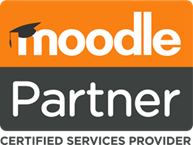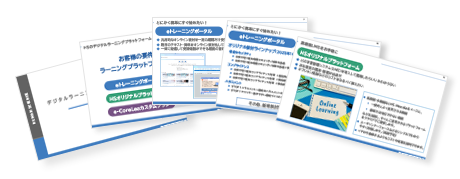2024.07.08
2025.09.26
What is a Learning Management System (LMS)? ~ From basic functions to implementation effects and recommended systems ~

In efficiently advancing human resource development and in-house training, what many companies are currently focusing on is the "Learning Management System (LMS)." In addition to centrally managing course histories and progress status, it can greatly reduce the workload of training staff through features such as online material distribution and automatic grading of tests. Furthermore, by "visualizing" each employee's learning status, it becomes possible to maximize training effectiveness and utilize it for human resource strategies.
This blog organizes the basic functions of LMS, the advantages and disadvantages of implementation, types, and selection points, and also introduces the representative system "Moodle." It provides content that serves as a basis for decision-making for corporate personnel who are considering improving training efficiency and strengthening human resource development.
Table of Contents
1. What is a Learning Management System (LMS)?
2. Functions of a Learning Management System (LMS)
3. Advantages and Disadvantages of Learning Management Systems (LMS)
4. Types of Learning Management Systems (LMS)
5. Recommended Cases for Implementing a Learning Management System (LMS)
6. Key Points for Selecting a Learning Management System (LMS)
7. What is the Recommended Learning Management System (LMS) "Moodle"?
8. Summary
1. What is a Learning Management System (LMS)?

A Learning Management System, called "LMS" (Learning Management System), is the foundational system for e-learning. It features a "learner function" that allows participants to view and take learning content, and an "administrative function" that enables administrators to grasp and manage progress and grades.
LMS supports not only online learning but also efficient management of overall learning, including group training and classroom lectures, visualization of learning status, and the creation of a system for continuous learning.
2. Functions of Learning Management Systems (LMS)

An LMS is an IT tool that centrally manages e-learning materials and learning progress, and it mainly has the following functions.
[Learner Functions]
| List of Enrolled Courses | Check Registered Courses |
|---|---|
| Course Enrollment | Select the course you want to learn and start attending |
| Table of Contents | Understand the overall course flow |
| Learning videos and slides | Watch materials and study |
| Test | Take the comprehension check test |
| Submit report | Submit assignments online |
| Display grades | Check test and assignment results |
| Learning history | Review progress and past course status |
| Questions | Consult instructors or administrators with questions |
[Management and Instruction Functions]
| Register and distribute teaching materials | Upload teaching materials and provide an environment where learners can study |
|---|---|
| Registration and Management of Learners | Comprehensive Management of Learner Information and Learning Status |
| Tracking Learning Progress | Real-time Monitoring of Learning Progress and Grades |
| Test Creation and Implementation | Create and Conduct Online Tests and Quizzes |
| Assignment Management | Distribution of Assignments, Checking Submission Status, Evaluation, and Feedback |
| Aggregation and Analysis of Grades | Aggregate test and assignment results and analyze learning effectiveness |
| Communication Support | Support interactions between instructors and learners via bulletin boards and chat |
| Question Management | Manage the history and status of learners' questions and answers |
| Utilization of Learning History | Check progress rates and material usage status to improve learning |
3. Advantages and Disadvantages of Learning Management Systems (LMS)

"It seems convenient, but is it suitable for us?" To answer such questions, we clearly summarize the advantages and disadvantages of LMS.
Benefits
Benefits for Learners
・Learning achievements are recorded
Since the distribution of materials and course attendance are basically managed by the LMS, all individual learning histories and grades are recorded on servers, etc. The recorded data can be accessed by instructors and administrators who have the appropriate permissions.
・You can learn at your own pace anytime, anywhere
Unlike group training sessions that have fixed dates and locations, as long as you have a mobile device and an internet connection, you can study anytime and anywhere. Being able to learn freely at your own pace is a major advantage. The ease of access also helps to establish a habit of learning.
・You can review as many times as you want
In-person training sessions are limited to that day only and end when the time is up. Even if you keep the text materials, the opportunity to be "taught" is only once. On the other hand, with an LMS, repeated attendance is possible, allowing you to thoroughly review and study until you fully understand.
Benefits for Administrators
・Can provide consistent education to a large number of learners
In group training sessions, the number of participants per session is limited. Also, even when using the same text, the "quality of education" can vary depending on the instructor. By using an LMS, you can deliver exactly the same educational content regardless of the number of participants.
・It can be realized at a lower cost compared to group training
When a certain company that introduced an LMS conducted a cost estimate, the result showed that if the educational program they started using the LMS were conducted as group training, it would cost about four times as much as using the LMS.
・There are various ways to procure teaching materials
The methods for procuring teaching materials used on the LMS are diverse, including ① purchasing ready-made products, ② ordering custom-made materials, ③ customizing ready-made products, and ④ producing materials in-house (often referred to as internal production). By combining these options, it becomes easier to add originality and pursue an ideal educational program.
Disadvantages
Disadvantages for Learners
・Internet connection is essential: learning is not possible without access
・Learning to operate is necessary: there is effort required to learn how to use the system
・Self-management is important: maintaining motivation depends on the individual
Disadvantages for Administrators
・Implementation and operational costs: There are expenses associated with using the system
・Complexity of operation: IT literacy is required
・Burden of creating materials: Some degree of self-production is necessary
・Technical troubles: Malfunctions and connection issues may occur
・Not suitable for practical training: Experiential or face-to-face formats are difficult to support
・Weak enforcement: Learners need to proceed voluntarily
・Maintaining motivation is a challenge: Continuing learning depends on self-management
4. Types of Learning Management Systems (LMS)

To choose the perfect LMS for your company or school, it is important to understand the characteristics of each type. Here, we have organized the representative types.
| Cloud-based and On-premises | The difference between using it easily via the cloud or installing and operating it on your own company server |
|---|---|
| Specialized Type / Integrated Type | Whether it is a type strong in specific functions or a type that can use multiple functions collectively |
| For Businesses / For Schools | Whether it is suitable for business training or designed for educational institutions |
| Supports Both Internal and External / Internal Only (For Businesses) | Whether it can be deployed not only for internal training but also for clients and customers |
| With teaching materials / Self-created teaching materials | Whether standard teaching materials are included or you need to create your own |
| Mobile compatible / Not compatible | Whether learning is possible on smartphones or tablets |
5. Cases where the introduction of a learning management system is recommended
Not every learning scenario requires the implementation of an LMS. Here, we will introduce three cases where an LMS is particularly recommended.
Case 1: A large-scale case with tens of thousands of participants
At a certain university, approximately 85,000 students receiving instruction via correspondence were submitting their assignments by mail. This incurred a lot of time and mailing costs. Additionally, there is a possibility of sending to the wrong address, resulting in the submissions not reaching the students. It is also necessary to manage separately who was mailed and who submitted the assignments. Implementing an LMS in such large-scale cases, where the number of students exceeds tens of thousands, has many advantages.
How will the process change with LMS? For example, teachers place assignments in specific locations on the LMS. Learners access the LMS and download the assignments given to them. Once the assignments are completed, they upload them to the designated location on the LMS. Teachers evaluate the uploaded assignments. Teachers can check a list of who has submitted the assignments. They can also send reminder emails to only those learners who have not submitted. With LMS, significant savings in time and costs can be achieved.
> LMS Case Study: The Open University of Japan
Case 2: Certification Examination Case
There are many certification exams that certify specific qualifications. In order to have many people obtain qualifications, it is necessary to establish as many exam venues as possible. If there are only exam venues in Tokyo and Osaka, candidates will incur significant travel expenses. On the other hand, for those conducting the exams, increasing the number of exam venues will also lead to higher operational costs. In cases of certification exams like these, implementing an LMS has many advantages.
How will the process change with LMS? In a certain certification exam, there are two components: a presentation and a written test. First, the presentation is conducted via an online meeting system from the LMS. Two examiners watch the presentation, conduct a Q&A session, and register the evaluation sheet in the LMS. Next, the examiners use the assignment feature of the LMS to create questions for the candidates to answer. The examiners review the answers and determine the pass or fail status, notifying the administration via the LMS messaging feature. After that, the administration informs the candidates of their results through the LMS messaging feature.
By converting certification exams to an online format, participants can take the exam at home without having to travel to a testing location. Additionally, the reviewing side no longer needs to set up multiple testing venues. Furthermore, evaluation sheets and assignments can be centrally managed, making internal sharing easier.
> LMS Utilization Case: The Japanese Society of Gerodontology
Case 3: Providing information to educational and medical institutions
Teachers, doctors, nurses, and others in educational and medical institutions are busy every day. In this context, they must learn various technologies that are advancing daily. To provide information for this purpose, we publish materials and books, and conduct seminars and study sessions. Particularly in the case of seminars and study sessions, one must go to a specific place at a specific time. Participating in such events can be quite challenging amidst their busy schedules. In such cases, implementing an LMS offers many advantages.
How will the process change with LMS? In a certain academic society, they utilize LMS to provide new information and hold seminars for their members. Members can learn at their own pace without being constrained by time or location. Additionally, seminars using online conferencing systems allow participation from any location. Furthermore, LMS enables tracking the number of participants for each course and seminar, allowing for adjustments to the content based on participation levels, striving to make it more accessible to a larger audience.
> LMS Utilization Case: The Japanese Association of Emergency Nursing
6. Key Points for Selecting a Learning Management System (LMS)
“I want to introduce an LMS, but I don’t know which one to choose…” Many people have such concerns. Here, we have clearly organized the key points to keep in mind when selecting an LMS.
| Cost-effective | Can be used at a price that is reasonable for implementation and operation |
|---|---|
| Includes necessary features | Standard equipped with basic functions required for learning management |
| Easy operability | Can both learners and administrators handle it intuitively |
| Thorough security | Can be operated safely and, in some cases, used without an internet connection |
| There is a wealth of information available for reference | Is it easy to get hints for solutions from user communities and forums? |
| High customizability | Can it be flexibly configured and extended to suit your company’s or school’s operations? |
A representative LMS that meets these points is Moodle. Next, let’s take a closer look at its benefits.
7. What is the recommended learning management system "Moodle"?
Here, we will introduce one recommended learning management system. It is "Moodle." (pronounced 'Mooduru')
Moodle is a license-free, open-source learning management system. It is widely used not only in educational settings but also in companies and various organizations.
Benefit 1: No licensing fees, cost advantages
Moodle is an open-source learning management system (LMS) with no basic licensing fees. For example, other cloud-based LMS providers may charge licensing fees ranging from several hundred thousand yen to over one million yen annually even for small-scale use with around 50 learners. However, with Moodle, there are no licensing fees; the only costs are for server fees and operational support.
Therefore, it is possible to reduce costs by several hundred thousand to several million yen annually, allowing the budget to be redirected towards content creation and instructor support. This is a significant advantage for small and medium-sized enterprises or schools that want to efficiently establish an e-learning environment within a limited budget.
Benefit 2: Leverage a large and active community
Because Moodle is an open-source LMS widely used around the world, it has a large and active user community. The official forums receive thousands of posts and questions every month, where information on customization and troubleshooting is shared daily.
For example, there are many cases of Moodle being implemented in educational institutions and companies within Japan as well, allowing users to easily learn tips on creating teaching materials, course design, and how to use plugins from the community. Since you can quickly search or ask questions when in trouble, it provides peace of mind even if there are few dedicated IT staff within your organization.
By leveraging the Moodle community in this way, you can lower the barriers to introduction and operation, and create a more efficient learning environment.
> Moodle Community
> Moodle Documentation
Benefit 3: Security you can trust for companies and educational institutions
Some people may worry, "Is open-source Moodle safe?" but in reality, it has solid security measures. Moodle is used by many universities and companies worldwide, and security updates are regularly provided through the official website.
For example, the official Moodle site publishes security release information every month, and if vulnerabilities are found, patches are immediately provided. Additionally, administrators can finely configure access permissions and monitor logs, enabling safe management of internal data and learner information.
Furthermore, if operated on an internal server, it can be used without connecting to the internet, further reducing the risk of external attacks. Because it is open source, it is monitored by users and developers worldwide, creating a security environment that is actually more trustworthy.
> Moodle Release Information
> [Moodle Basic Course] Moodle Security Measures
Benefit 4: Customization is possible to change and expand according to our unique educational system
One of Moodle's major attractions is its flexibility to be modified and expanded according to the unique educational system of your company or school. For example, in corporate training, if you want to operate separate courses such as a "Basic Course for New Employees" and a "Leadership Course for Managers," you can set different curricula and test formats for each.
Furthermore, Moodle offers a wide variety of plugins, allowing you to add features as needed. For example,
Quizventure Plugin: Learn by solving quizzes in a game-like manner
Attendance Plugin: Enables attendance management both online and offline
Certificate Plugin: Automatically issues certificates of completion, enhancing the sense of achievement in learning

In universities and vocational schools, it is also possible to customize according to different course rules and grading methods for each faculty. For example, you can set the report submission method to PDF only, or configure the system to automatically unlock the next learning material based on the progress of online classes.
In this way, with Moodle, you can adapt the system to "your own way," enabling efficient and effective learning management without disrupting the existing educational framework.
> Moodle Plugin Directory
> 【What Types of Moodle Plugins Are There?】
Benefit 5: Useful When Handling Highly Confidential Materials
When handling highly confidential e-learning materials, information leaks outside the company pose a significant risk. Since Moodle is open source and can be built in a dedicated environment, you can fully manage materials and learner data on your own company server.
For example, when distributing training materials limited to internal use, installing Moodle on an internal server allows use without an internet connection. This greatly reduces the risk of external access and unauthorized copying.
About Moodle Official Partners
Moodle is an open-source LMS with a high degree of freedom, but many people find "configuration, operation, and customization difficult." In such cases, a reliable resource is the Moodle Certified Partner. Certified partners are professionals who hold official Moodle qualifications and can provide extensive support from implementation to operation, customization, and troubleshooting. For example, if you want to securely build an internal training environment or add custom features to achieve efficient learning management, you can receive concrete design and implementation support.
Here are specific support examples provided by partners.
・Environment Setup Support: Server configuration, installation, and network environment optimization
・Customization Support: Adding features tailored to company-specific evaluation systems and course designs
・Content Migration and Data Management: Migrating existing e-learning materials to Moodle and managing them securely
・Operation and Management Training: Creating operation manuals and conducting training for administrators and instructors
・Troubleshooting and Security Measures: Regular updates, vulnerability handling, and establishing backup systems
Even companies or schools introducing Moodle for the first time can start operating with peace of mind in a short period by consulting with a partner. Because they have official support knowledge and practical experience, troubles caused by configuration errors and security risks are minimized.
In other words, Moodle certified partners are reliable entities that provide an "environment where you can confidently master Moodle". If you have concerns about introduction or operation, leveraging experts’ help allows you to efficiently and safely establish your learning environment.
> Moodle Certified Partners (Japan)

8. Summary
A Learning Management System (LMS) is a convenient tool that enables efficient management and operation of online learning. Since it integrates essential functions for learning—such as tracking course progress and grades, distributing materials, and submitting tests and reports—into a single platform, it is widely used in educational settings at schools and companies.
When choosing an LMS, it is important to select a system that fits your learning environment by focusing on points such as cost, required features, usability, security, and customizability.
Moodle, in particular, is highly attractive because it has no licensing fees and allows you to create a unique learning environment with its abundant plugins and customization features. Additionally, the large community makes it easy to obtain information and support when you encounter difficulties, which is reassuring. Furthermore, by utilizing Moodle certified partners, implementation, operation, and customization can proceed smoothly.
By effectively utilizing a learning management system, you can provide effective learning tailored to each learner and improve the quality of education. For those planning to introduce an LMS, be sure to choose and utilize a system that meets your needs.
Our company, Human Science Co., Ltd., has been involved in creating educational materials since the early days of e-learning in Japan, building over 20 years of experience. We hope that the accurate know-how based on this extensive track record will be useful for your business. We offer a variety of e-learning solutions, including LMS implementation, content creation, and multilingual content development. Please feel free to contact us.
> Human Science Co., Ltd. e-Learning Site
> Moodle Implementation Support & Operation












